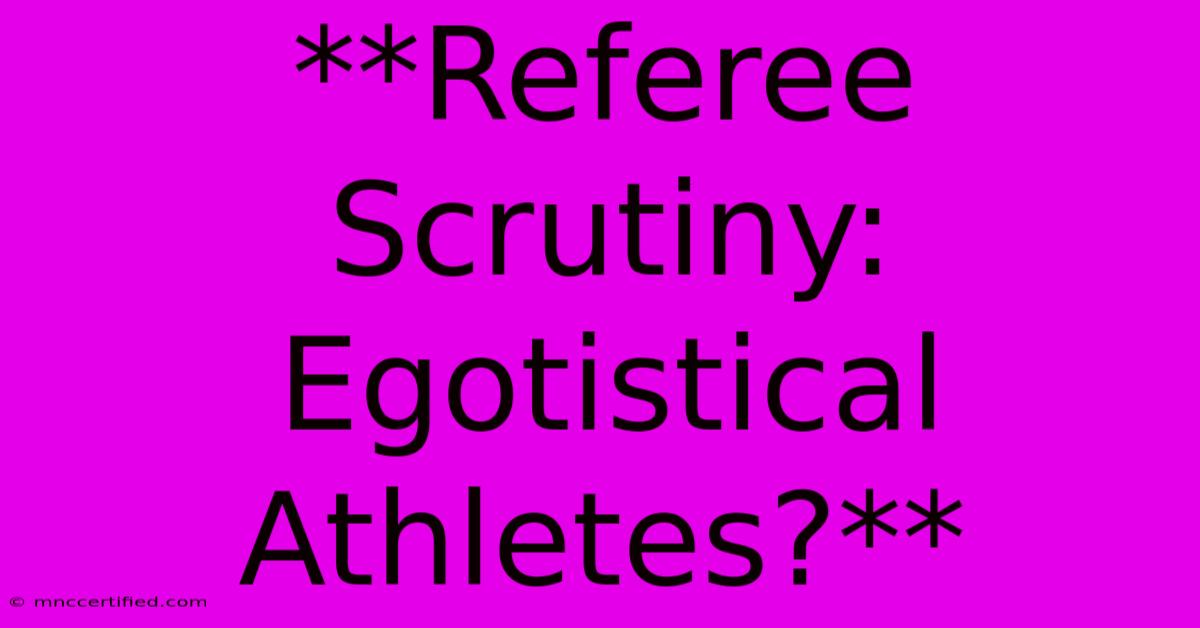**Referee Scrutiny: Egotistical Athletes?**

Table of Contents
Referee Scrutiny: Egotistical Athletes?
The relationship between athletes and referees is a complex dance, often fraught with tension and misunderstanding. While the athlete strives for victory, the referee strives for fairness. But in recent years, a growing narrative has emerged: athletes are increasingly disrespectful and aggressive towards referees, fueled by inflated egos and a sense of entitlement. Is this a legitimate concern, or are athletes simply being unfairly targeted?
The Rise of Athlete-Referee Conflict
The debate surrounding athlete conduct towards referees is not a new one. However, social media and increased media coverage have amplified incidents, making it feel more pervasive. We see players arguing calls, questioning their judgment, and even engaging in verbal abuse. These situations, often fueled by the pressure to perform and the desire to win at all costs, paint a picture of athletes who feel above the rules and the officials enforcing them.
Examples of Recent High-Profile Incidents
- NBA: LeBron James's heated exchange with officials in the 2023 NBA Finals raised eyebrows about his perceived lack of respect for referees.
- NFL: Tom Brady's history of arguing calls and displaying frustration towards officials has led to fines and public scrutiny.
- Soccer: Cristiano Ronaldo's infamous "push" on a referee in a Champions League match highlighted the growing frustration among athletes.
Beyond Ego: Understanding the Factors
While it's easy to label athletes as "egotistical," a deeper analysis reveals more complex factors driving this behavior:
- Pressure to Perform: The intense scrutiny and high stakes of professional sports create immense pressure on athletes to succeed. This pressure can lead to frustration and anger when perceived injustice occurs.
- Emphasis on Individualism: Modern sports culture often glorifies individual achievement, fostering a "me first" mentality. This can contribute to a lack of respect for authority, including referees.
- Lack of Communication and Empathy: The gap between athletes and referees can be exacerbated by a lack of communication and understanding. Athletes may feel unheard by referees, leading to misunderstandings and frustration.
The Impact of Athlete Conduct
The behavior of athletes towards referees has serious implications for the integrity of the game:
- Erosion of Respect for Authority: Disrespectful behavior by athletes can erode the respect for referees and the rules of the game.
- Negative Impact on Fans: Aggressive behavior from athletes can alienate fans and create a hostile environment for spectators.
- Potential for Escalation: Extreme cases of disrespect can escalate into physical confrontations, leading to injuries and further controversy.
Striving for a Solution
Addressing this complex issue requires a multi-pronged approach:
- Promoting Sportsmanship: Education and training programs emphasizing sportsmanship and respect for referees are crucial.
- Improved Communication: Encouraging communication and understanding between athletes and referees can bridge the gap and foster trust.
- Stronger Enforcement: Consistent and transparent enforcement of rules regarding athlete conduct is essential for holding players accountable.
- Shifting the Narrative: Promoting a culture of mutual respect and understanding, highlighting athletes who demonstrate positive behavior, can help change the perception of athlete-referee relationships.
Conclusion
While the rise of athlete-referee conflict is a legitimate concern, it's important to recognize that it stems from a complex interplay of factors. By understanding the pressures, challenges, and underlying causes, we can work towards fostering a more respectful and harmonious environment in sports. Ultimately, the success of any sport relies on the integrity of the game, which is strengthened through mutual respect and a commitment to fair play.

Thank you for visiting our website wich cover about **Referee Scrutiny: Egotistical Athletes?**. We hope the information provided has been useful to you. Feel free to contact us if you have any questions or need further assistance. See you next time and dont miss to bookmark.
Featured Posts
-
Holster For Bond Arms Snake Slayer
Nov 15, 2024
-
David Coote Video Sparks Controversy
Nov 15, 2024
-
Blast Crypto Price Prediction 2025
Nov 15, 2024
-
Brazil Vs Venezuela Fifa World Cup 2026 Updates
Nov 15, 2024
-
Bankruptcy Auction The Onion Buys Infowars
Nov 15, 2024